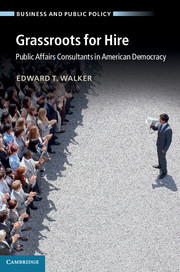Book contents
- Frontmatter
- Dedication
- Contents
- List of figures
- List of tables
- Acknowledgements
- Part I Sources
- Part II Structure
- 4 Methods for mobilizing the public
- 5 Corporate grassroots
- 6 Outsourcing advocacy? Consulting for associations
- Part III Outcomes
- Appendix 1 Identifying consulting firms (baseline data)
- Appendix 2
- Appendix 3
- Appendix 4
- Appendix 5
- Appendix 6 Models of consulting for non-trade associations
- Appendix 7 Models of consulting for trade associations
- Appendix 8 On public affairs consulting as a profession
- Bibliography
- Public documents referenced
- Index
5 - Corporate grassroots
Published online by Cambridge University Press: 05 June 2014
- Frontmatter
- Dedication
- Contents
- List of figures
- List of tables
- Acknowledgements
- Part I Sources
- Part II Structure
- 4 Methods for mobilizing the public
- 5 Corporate grassroots
- 6 Outsourcing advocacy? Consulting for associations
- Part III Outcomes
- Appendix 1 Identifying consulting firms (baseline data)
- Appendix 2
- Appendix 3
- Appendix 4
- Appendix 5
- Appendix 6 Models of consulting for non-trade associations
- Appendix 7 Models of consulting for trade associations
- Appendix 8 On public affairs consulting as a profession
- Bibliography
- Public documents referenced
- Index
Summary
Introduction
Individual corporations are the leading source of business for public affairs consultants, both in terms of their overall revenue and also as a share of their aggregate client base. The expansion of business political mobilization starting in the 1970s made possible the development of the field of grassroots public affairs consulting, and corporations have, in turn, remained a lucrative source of revenue for consultants. While corporate political activism has become a more common topic of popular discussion since the Supreme Court’s 2010 ruling in Citizens United v. Federal Election Commission (described in greater detail in Chapter 8), corporations have been engaged in political activity far beyond insider lobbying and funding Political Action Committees (PACs) for many years prior to this decision.
But unlike advocacy organizations, which are generally structured for mobilizing the participation of their members – whether through face-to-face organizing or through mediated forms like mass email or other types of “clicktivism” – corporations do not typically possess in-house structures and routines for generating mass political activism on their behalf. Although it’s undoubtedly true that the in-house public affairs function at many firms has become much more encompassing in recent decades and firms do at times use these offices to facilitate activism by employees, shareholders, suppliers, distributors, and/or executives, the services of one or more consulting firms are often necessary when a company seeks to mount a large-scale grassroots effort.
- Type
- Chapter
- Information
- Grassroots for HirePublic Affairs Consultants in American Democracy, pp. 108 - 130Publisher: Cambridge University PressPrint publication year: 2014
- 1
- Cited by

